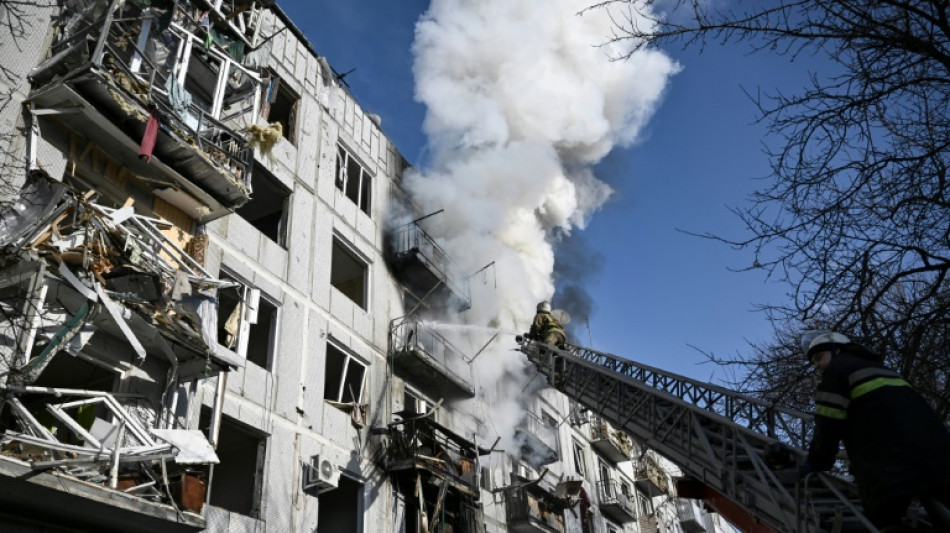

Attacks across Ukraine as dozens die in Russian invasion
Invading Russian forces pressed deep into Ukraine as violence spiralled Thursday, claiming dozens of lives and raising the prospect Moscow will march on Kyiv as the West imposed punishing sanctions in response.
In a day of intense fighting, Russian missiles and shelling rained down on Ukrainian cities, forcing civilians to seek shelter on metro systems, with others displaced by deadly airstrikes.
Across Ukraine, at least 68 people were killed, including both soldiers and civilians, according to an AFP tally from Ukrainian official sources.
Moscow's forces seized a key strategic airbase near Kyiv as well as the scene of the Chernobyl nuclear disaster, a vast area still heavily contaminated with radioactive material.
Witnesses told AFP that Russian paratroopers wrested control of the Gostomel airfield after swooping in with helicopters and jets from the direction of Belarus.
"The helicopters came in and then the battles started. They were firing machine guns, grenade launchers," resident Sergiy Storozhuk said.
The airfield could now provide a strategic staging post for Russian forces to ferry in troops who could then launch an assault on government buildings and the presidency in Kyiv.
Western intelligence has said that Russia is seeking to mass "overwhelming force" around the Ukrainian capital and that Moscow has established "complete air superiority" over Ukraine.
Elsewhere, Russian ground forces moved into Ukraine from the north, south and east, forcing many Ukrainians to flee their homes as the sound of bombing reverberated.
Moscow's defence ministry said its forces had "successfully completed" their objectives for the day, earlier claiming to have destroyed over 70 Ukrainian military targets, including 11 airfields.
Olena Kurilo was among 20 wounded after a blast sent shards of glass from her windows in the eastern Ukrainian town of Chuguiv.
"Never, under any conditions will I submit to (Russian President Vladimir) Putin. It is better to die," the 52-year-old teacher said, her face swathed in bandages.
- Fall of Chernobyl -
Ukrainian President Volodymyr Zelensky said there was now a "new iron curtain" between Russia and the rest of the world, like in the Cold War.
US President Joe Biden announced export controls against Russia to cut off more than half of the country's high-tech imports, alongside sanctions on Russian elites he called "corrupt billionaires", and banks.
He earlier said the G7 group of wealthy nations had agreed to impose "devastating" economic sanctions.
Biden once again said additional US forces were not heading to eastern Europe to fight in Ukraine, but would defend "every inch" of NATO territory.
Weeks of diplomacy failed to deter Putin, who massed over 150,000 troops on Ukraine's borders in what the West said was Europe's biggest military build-up since World War II.
Air raid sirens sounded over Kyiv at daybreak after the city's main airport was hit in the first bombing of the city since World War II.
The city declared an overnight curfew but said underground stations would remain open throughout to serve as bomb shelters.
Zelensky called the attack on Chernobyl "a declaration of war on all of Europe" while 18 people were killed at a military base near the Black Sea port of Odessa in the deadliest single strike reported by Kyiv.
Ukraine also said a military plane with 14 people on board crashed south of Kyiv and that officials were determining how many people died, while a transport plane crashed in Russia killing the crew.
Ukrainian forces said they had killed "around 50 Russian occupiers" while repulsing an attack on a town on the frontline with Moscow-backed rebels, which could not immediately be confirmed by AFP.
- 'Significant economic risk' -
In the Ukrainian village of Starognativka near the frontline where separatists have faced off against Kyiv's forces, official Vladimir Vesyelkin said missiles had rained down since the morning and power was out.
"They are trying to wipe the village off the face of the earth," he said.
Ukraine said Russian tanks and heavy armour crossed the border in several northern regions, in the east as well as from the Kremlin-annexed peninsula of Crimea in the south.
The fighting spooked global financial markets, with stocks plunging and oil prices soaring past $100.
IMF chief Kristalina Georgieva said the unrest carried "significant economic risk" for the world, but Putin insisted he did not seek to undermine the global economic system.
In a televised address, Putin justified the assault as a defence of the self-proclaimed Donetsk and Lugansk republics in eastern Ukraine.
The Kremlin earlier said the leaders of the two separatist territories had asked Moscow for military help against Kyiv after Putin recognised their independence on Monday.
A conflict between the separatists and government forces has dragged on since 2014, killing more than 14,000 people on both sides.
NATO said it had activated "defence plans" for allied countries but alliance chief Jens Stoltenberg said there were no intentions to send NATO forces into Ukraine.
Russia has long demanded that Ukraine be forbidden from ever joining NATO and that US troops pull out from Eastern Europe.
Demonstrators took to the streets of European capitals to condemn Russia but a small anti-war protest in Moscow was quickly shut down by police and monitors said over 1,400 people were detained across the country.
The first Ukraine refugees have begun to trickle into Hungary and Romania.
burs-gw/jv
T.Murphy--MP




